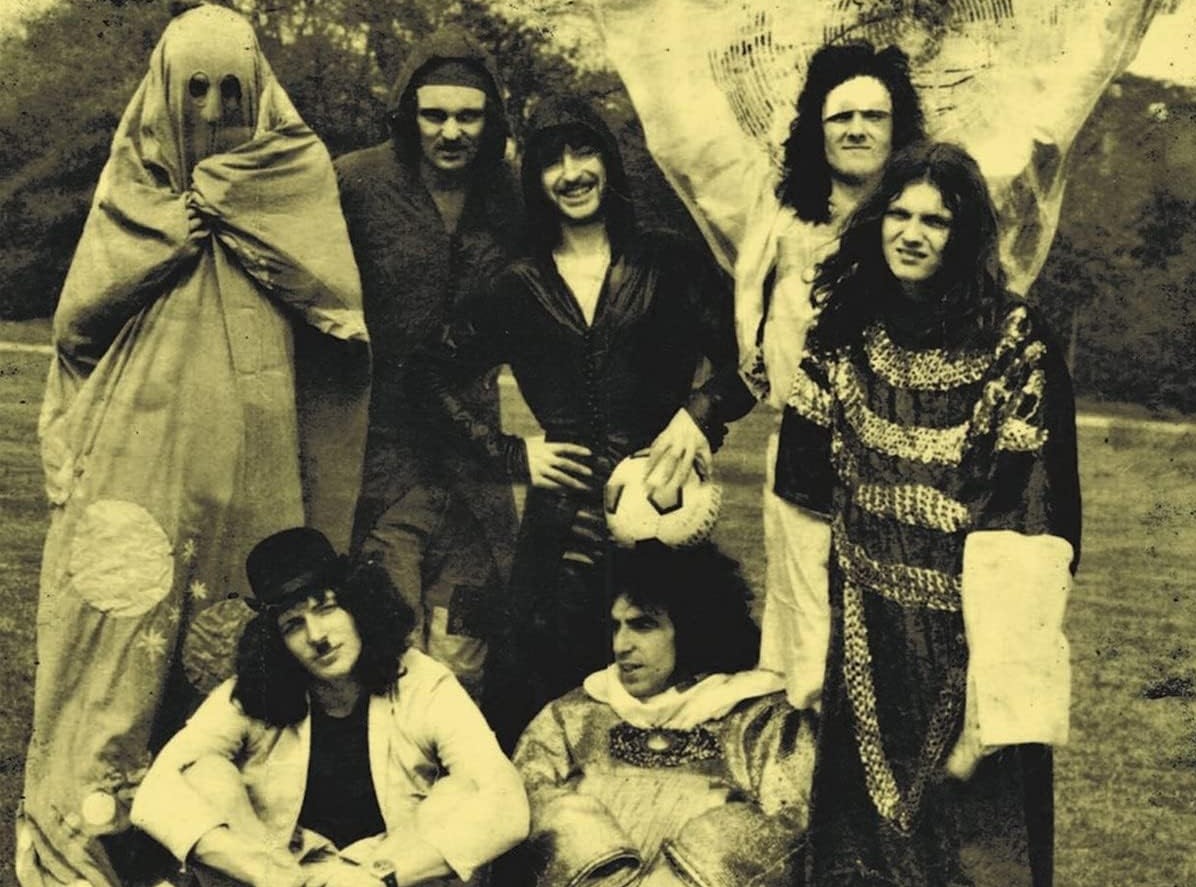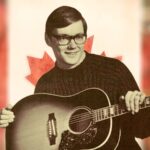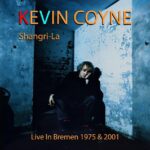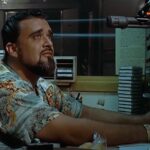
For the first time we’re in a cultural age of music when last or ‘best of’ somehow define or equate with past classics, in this time of clichés like ‘national treasure’ even (God forbid) ‘superstar’. But why not celebrate origins from first albums on—maybe their inspiration can influence now as then? After all, television has classics without the current need to pump it with octogenarians, like the odd media-led obsession for America (4% of the world’s people consuming four times more than the 96%). As in Colin Wilson’s The Outsider (1956) about creative spirits’ vision to survive, this goes in various directions: words are horizontal yet music, like painting, can be vertical; these diverse aspects unified in west London for a decade.
A new 3-CD set from Cherry Red Records (Deviation Street: High Times in Ladbroke Grove 1967-1975) blows smoke off origins and context in a clearer view of England’s counterculture during those crazy days before band names were copied by the unknowing or, unthinkably (literally) cloned for money as identikits not originals. Its 48-page booklet on West London’s micro-cosmic W10-11 backs this claim. Surprises even in the same street for those there at the time (Family—a fun clapping B-side about their road when in the film Groupie—Steamhammer, Roxy Music!) shoulder-rub dustier artefacts left behind in their slipstream. It spliffs up with Quintessence but NOT the group-written single (Notting Hill Gate) which is two minutes shorter and does start with lighting a spliff! Its swirling sitar and guitar waved in 1970 when re-recorded weeks after their LP and on a film by Pink Floyd’s lightman, plus Q’s Cosmic Surfer from their third charting LP which should’ve been a single. An apt band name for the time and place.
Hawkwind Zoo (first spelt Hawquins Zoo) recorded at Abbey Road five months before their debut’s sessions, which included an edited single: this extended Hurry On Sundown comes from that first session. Another was taped for John Peel, and each had a different guitarist. We Took The Wrong Step Years Ago reprises their ’71 classic In Search Of Space heralding space rock after UFO’s comet flash (seen mangled by new guitarist Larry Wallis on French T.V.). Awash with SFX for Space Ritual which didn’t even break for applause, it’s total cosmic immersion (tour support Magic Muscle recorded too late as did Nik Turner’s ICU). High point was Silver Machine over TOTP’s credits on a year-end Xmas show. There’s also Motorhead with Lemmy ‘I’ve got a sick hobby’ Kilmister for the lyrically superb Lost Johnny (co-written with Farren for Hawkwind), Robert Calvert’s solo project Captain Lockheed…, and Michael Moorcock’s then-unreleased variant Kings Of Speed written for Hawkwind the same year (1974).
The first CD climaxes with the Edgar Broughton Band’s call-to-arms response to The Fugs with Out Demons Out, one of Broughton’s most acid guitar licks and progressive label Harvest’s first singles as well as inaugural Top 40 hit. Each CD fittingly closes with reverberating statements like this. If Rap came from American prison writing, this rebellion spread from wider cultivated, longer fermenting vineyards. These three bands of freedom fighters led a psychedelic vanguard through festivals (like the first Glastonbury before mugged by profiteers), benefits and free concerts nationwide when “Getting it straight in Notting Hill Gate” forged an alternative lifestyle.
Names that seeded reputations in those lurid side streets include Tomorrow’s 1968 Parlophone LP featuring Twink and Steve Howe several months after a debut 45, as well as their later short-lived incarnation Bodast’s unreleased Black Leather Gloves blasting a couple of years early. A young Pete Bardens, son of the founder of Panorama, grew up in the Gate and after Shotgun Express, Them, and Love Affair, formed a trio Village in ’68 who often opened at ex-accountant Harold Pendleton’s Marquee club including their 9th National Blues Festival with East of Eden, Junior’s Eyes, and Pink Floyd. As well as the B-side of their only single, an atmospheric organ-led instrumental on Pye-distributed Head in mid-’69, is Barden’s Transatlantic solo LP with some nice wah-wah.
Lemmy’s first recordings weren’t with Hawkwind of course but acid-drenched Sam Gopal, i.e. a local Malaysian-born tabla player now living in Asia, on a Stable Records debut LP (1969). Though linked to Trojan Records, it was distributed from a record shop at 297 Portobello Road which also issued The Deviants (pre-Pink Fairies) fronted by Mick Farren, here at their rockiest (and shortest) with Slum Lord from second LP Disposable and the boxset’s title Deviation Street from the self-released Ptooff! (1968) rambling with dread over SFX. The UFO doorman /International Times editor’s solo Mona (Transatlantic) atypically boogies with Cochran’s Summertime Blues. Also, the Pink Fairies’ Uncle Harry’s Last Freakout sparked by a police ambush while playing in Holland Park, the ultimate stoned wig-out (paralleled only by Bakerloo?) but missed alas is their Portobello Shuffle from Bunch of Sweeties. Appropriately and modestly, IT’s cover banner heralded “Culture, Space, Love and the Invisible Insurrection of a Million Minds”.
Mod legends The Action sees an unreleased I’m A Stranger from early ’68 when they moved in next door to Family (and ‘borrowed’ their electricity; Joe Boyd also lived in that Lots Road, where Dr. Strangely Strange stayed to record their debut and buy a Howson Phonofiddle in the ’Bello Market). High hopes for Action led to such heavyweight producers in turn as George Martin, Guy Stevens, and Gomelsky. After a sniffy opinion from Marc Bolan—who like Bowie wasn’t underground but careerist exploiting any fad-not-cause they came across—Action led to rechristening as Mighty Baby and Head Records, founded by their roadie John Curd albeit for only nine releases. Album follow-up A Jug Of Love (Blue Horizon 1971) has Slipstream wafting unusually with mandolin and slower vocals reflecting their new Sufi spirituality, as did a later outfit The Habibiyya on Island (1973), not on this compilation. Mighty Baby were for a short time in the heart of the Grove’s daily life, soon becoming the busiest sessioneers of the era.
Despite production by Tony Visconti, the ill-fated Tickle’s Subway from a sole Regal Zonophone 45 in ’67 failed to hit. Songwriter-guitarist Mick Wayne then formed the more underground Junior’s Eyes, with a Regal A-side two years later that’s redone on their LP. Heavy giggers at first until doubling as David Bowie’s backing band, they split in early 1970 but also appear here on Sam Hutt’s Boeing Duveen & The Beautiful Soup’s mid-’68 B-side Which Dreamed It: sitar, bells, effects and all shades of potpourri. Hutt, a local community doctor, reincarnated as Hank Wangford. Early casualties include The Misunderstood, unprofessional John Peel’s American group dumped on his mother’s Notting Hill home, with a surprisingly heavy-fuzzed unreleased demo from October 1966 the month Jimi Hendrix arrived up the road to jam around and get a band together.
Also unearthed is Mataya’s demo Changes from early 1971, a mixed-race group of those multicultural lanes. Police raids at the Mangrove Caribbean restaurant and squats provoked tension that rerouted a renamed Carnival in 1970 as locals celebrated wherever they could. This popular band were invited into a Mayfair studio by Chris Blackwell’s label-starting accountant, two tracks amazingly swirl here so evocatively you almost swoon. Roger Bunn, once of festival bill regulars Giant Sun Trolley and then Djinn, provided songs for Bowie via Tony Visconti and recorded at EMI the solo Piece Of Mind (Major Minor 1970) also on Ohr in Germany where he played with several groups and Phillips in Holland with an orchestra. His airy Powis Square Child sounds almost like the absent Magic Michael. Bunn was on Piblokto’s albums with the late Pete Brown and spin-offs as well as The Gas Board (pre-Roxy Music) but refused Ferry’s edict to smarten up; he left in ’71 as a survivor in his own stream of consciousness to pass in 2005.
Throughout the box are buds from the Clearwater Agency that was integral to the scene: Cochise’s (ex-Plastic Penny, Tintern Abbey, Bluesology) eponymous United Artists debut (maybe a too-mainstream vocalist for their driving sound led by the underrated Patto-like guitarist Mick Grabham, who left for Procol Harum); Skin Alley’s dreamy debut Living In Sin which was on the CBS sampler Fill Your Head With Rock, and Sun Music from follow-up Two Quid Deal (Transatlantic) the price of the LP or a weekend stash; and punchy Pretty Things from Parachute (Harvest). The lopped-too-soon Trees waft through with a band-composed CBS debut opener edited for a single, at their pulsating best as if two bands in astral harmony of psychedelic rock blended with freak folk. They signed even before gigging (Dandelion for example lost out) when a chat in a local café led both to their and Clearwater’s formations; singer Celia Humphris was the partner then wife of another local, BBC DJ Pete Drummond, and her post-Trees career included advert voice-overs and the asinine Mind the Gap of the Northern Line. First gig was at All Saints Hall in mid-’69 with High Tide and Skin Alley, then Quintessence and The Village up the road in a Caribbean bar’s Metro Club.
Arthur Brown’s Kingdom Come, formed from his Derby-based band Charge, time-travels with the short title track of his tripping Galactic Zoo Dossier (1971 Polydor). I still see them at Margate’s Dreamland where the guitarist rocked literally garbed as a galleon! Another rated LP was Delivery on B&C with local resident Carol Grimes (later helping Rock Against Racism in ’76) and Canterbury scenesters who fused styles under Westway, as is the obscure Uncle Dog title track’s jazzy sax-rock (c.f. my separate interview with her on this time).
Surprises might be Stray’s All In Your Mind (non-album from a ’75 compilation but not the violin-added Italian single) as they were from Acton but their scintillating rock often lit up the Roundhouse (where the Middle Earth club moved to then Dingwalls club opening in ’73, as Camden evolved like Portobello). Another surprise might be Steamhammer’s 1970 CBS LP as local squatters decamped from sleepy Worthing at their most whimsical with double bass drums dormant. More underground was arch-jammers High Tide, who lived in Abbey Road, sounding Can-like opening their second Liberty platter of dynamism. Unreleased Tyrannosaurus Rex (Ring Of Fortune) is from the first mid-’67 session plus that duo’s Steve Peregrine Took’s next venture Shagrat, an unissued Still Yawning, Still Born recorded in Larry Wallis’ family garage.
Quiver from a first year’s eponymous debut (1971) were often compared to The Band after members of Cochise and Village joined highly rated guitarist Tim Renwick of Junior’s Eyes. They later penned a famous hit for Rod Stewart when they ran out of shafts to merge as soft rockers Sutherland Brothers & Quiver for albums on Island and CBS. First band to play the Rainbow, melodic Quiver here sound most ‘Brinsley’. Trader Horne from their stand-alone Morning Way (1970 Dawn) were a duo (ex-Fairport Judy Dyble the later wife of local entrepreneur Simon Stable, and Jackie McAuley of Them) who befriended Steamhammer when moving into the area. Her co-write with the latter’s Martin Quittenton is on that LP. Quirky purveyors of exotica were Third Ear Band, ethereal before Enya’s puberty. An unreleased song from their late 1970 Abbey Road sessions for the aborted The Dragon Awakes surfaces, before scoring Roman Polanski’s Macbeth (1971). They blossomed out of Festival warmers Hydrogen Jukebox and The Giant Sun Trolley of 1967 at obscure venues like Ladbroke Hotel and Safari Tent in Westbourne Park Road, tickling punters with baroque medievalism and cosmic ragas when forced to be acoustic after their gear was nicked.
Another legend was G.F. FitzGerald: Mouseproof (1970 UNI) was named after his band that supported Pink Floyd, Soft Machine etc. at early London clubs when offered a contract by Island too. April Affair showcases topical harmonies (“breezing down Portobello Road”) with such as Sam Gopal, Lemmy, Judy Dyble and Cochise’s B.J. Cole. The Scotsman later played with Gong and Lol Coxhill. The erudite Davey Graham looms from his childhood streets for a tablas-and-bass instrumental, trail-blazing to high repute as a folky world music pioneer; experimentalist Ron Geesin worked with Pink Floyd, Pete Townshend and Bridget St. John when a favourite of John Peel with an early electronica hum; and local celebrity (before the word was dumbed down) Ram John Holder, a 30 year-old Caribbean via Greenwich Village. Involved from ‘happenings’ to citizen rights, he cut three EMI singles (one produced by Paul Jones) before Black London Blues on Beacon Records, owned by the Antiguan Milton Samuel who issued UFO’s first spacey albums. Featured is the actor’s real-life Notting Hill Eviction Blues: psych-blues with a still-relevant message (“Everybody wake up!”).
From a garden emerges an unreleased Chimera (1970, on Morgan). These girl cousins did a confident harpsichord and guitar demo for Apple after accosting them in the street when in David Gilmour’s circle, and often dancing on contemporary T.V. music shows. Rosemary, formed from Tangerine Slyde and Harlem Speakeasy, were also unreleased but their two-side demo’s If/One Hand Clapping, influenced by Buffalo Springfield and Love, was planned by Major Minor Records as this quintet were well-known on the scene. Hapshash & The Coloured Coat, a duo of designers for posters and LPs next door to Oz magazine were Carnaby Street suppliers who owned Kings Road’s famous boutique Granny Takes A Trip. Managed by Guy Stevens, their LP in ’67 on Minit—with pre-Spooky Tooth combo Art—here features harmonica (surprisingly) and bongos (not) for an instrumental before pseudo-Kraut rock produced by Mike ‘Womble’ Batt.
Similar rainbow-riders are The Aquarian Age, i.e. Twink and John ‘Junior’ Wood with Nicky Hopkins and Clem Cattini lampooning Tomorrow’s Keith West in an inventive Parlophone ’68 single of Twink’s 10,000 Words In A Cardboard Box, issued when he was in the Pretty Things. Cat’s Paw led to three leading Afro-rock bands Osibisa, Assagai and Noir, of which the latter quartet’s LP (on Dawn 1971) included a dynamic seven-minute The System with Arthur Brown-like vocals (a compliment). Ubiquitous were Ginger Johnson & His African Messengers: African Party (1967) on little-known Masquerade was produced by Island co-founder Graeme Goodall and its funky Witchdoctor was a single years later. Some see the Nigerian, who died in 1975 when not yet 60, as the father of Afrobeat (e.g. a mentor for Fela Kuti) appearing in the inaugural Notting Hill Carnival of 1966 and first Gay Pride March six years later as well as at UFO (opened Xmas ’66 at 23 Tottenham Court Road), Seymour Hall with Floyd, Hyde Park with the Stones etc. when Disc & Music Echo hailed them as “hot, exciting…ecstatic and pulsating”.
This roadmap compilation adds Roxy Music’s mid-’71 pre-gigging home demo (by Eno) titled 2HB, a jazzy Arabic ode to the actor Bogart rather than a pencil. From their early days in squats, miner’s son Bryan Ferry was a teacher of ceramics at Holland Park School up the road in the soon yuppy-exploited end of the borough. The dawn of Punk (and haircuts) sees the 101ers’ (named after their squat’s street number) Silent Telephone, an unreleased communiqué from the autumn of 1975 guitar licked by Mighty Baby’s Martin Stone as they kick-started (literally?) the pub rock genre with a nine-month residency at the Elgin at 96 Ladbroke Grove, and a single with Dr. Feelgood’s producer. They also did free festivals including Stonehenge then, after the Sex Pistols supported them, front-man Joe Strummer went off to form the Clash instead.
The pre-gentrification Grove was Rotting Hill for residents, an urban slum ghetto Michael Moorcock recalls. But this “square mile of squalor” (The Times) meant more to those eking a living there. The year before the ‘60s even began Oswald Mosley was an MP candidate after local riots, and taxis refused (illegally) to venture there, so it was hardly hunky dory before. Close to troubled areas like Kilburn but only 20 minutes from the West End, local government fixed low rents for redevelopment. But just as Kingston-Upon-Thames or Muswell Hill spawned diversity (Fairport Convention, the Kinks, early Pink Floyd and Rod Stewart beside the celebrated Alexandra Palace that hosted the renowned 14-hour Technicolor Dream in April ’67 with over 10,000 heads), a cultural brew also bubbled here.
Caribbean halls and cafés sowed the first Fayre later called carnival, the London Free School in Powis Terrace from early ’66 whose founder’s son was Pink Floyd’s lightman and put on gigs (as name-dropped in Quintessence’s single), magazines like IT and Frendz (beside the Electric Cinema and Barney Bubbles’ design studio Teenburger) and community projects e.g. Release giving free legal aid or Alex Sanders, self-styled king of the witches, in a basement with coven for BBC T.V. children’s presenters Toni & Dave Arthur etc. All Saints Hall saw many debuts, and with the hip shops, cheap cafés and bookshops stocking underground press were Island Records and Blackhill Enterprises managing Edgar Broughton, Third Ear Band, Roy Harper etc. Not long after, nascent globalists arrived such as Virgin (opening a music shop full of bean bags above a shoe shop in Oxford Street as I recall) and Rough Trade in a well-known Notting Hill head shop in 1973.
It soon attracted a reputation. I read somewhere that Cat Stevens did a demo with Kim Fowley called Portobello Road, a B-side to a 1966 single. The Spectrum did a similar track on their Light Is Dark Enough that was heavily played on pirate radio, even Gilberto Gil and a chum did songs about it after returning to Brazil. Early buskers on that main street saw Dave Brock, Geoff Leigh (Henry Cow) and Alisha Sufit (Magic Carpet), an ethos evoked in the booklet’s images for 58 tracks of four-hour pleasure. The Quintessence is a rare blip as knowledge and no little diligence yield a treat comparable to acclaimed compilations such as Nuggets.
It’s hard to believe that even the humble Walkman, first called Sony Stowaway because of easy mobility, was still years away in 1980. Electric Eden saw the preceding decades as: “The intensified vision of childhood, and the mourning of its loss, are the defining characteristics of both Romanticism and English psychedelia”. Ah, but did they know that back then? Colin Wilson’s second book on outsiders closes with a Yeats’ poem about three old Chinamen looking down on the end of their decaying society; their response seems appropriate here as civilization is bled out by technology: On all the tragic scene they stare/ One asks for mournful melodies / Accomplished fingers begin to play / Their eyes ‘mid many wrinkles / Their ancient, glittering eyes happy.
BRIAN R. BANKS
Further information
Deviation Street: High Times In Ladbroke Grove – 1967-1975, 3CD Box Set
High Times In Ladbroke Grove 1967-1975 podcast
Also available on The Strange Brew:
*Podcasts: Jackie McAuley, Twink, Dick Taylor, Wally Waller, Jon Povey, Phil Manzanera, Hawkwind, Arthur Brown, The Action’s Rolled Gold, Jackie McAuley
*Interviews: Krzysztof Henryk Juszkiewicz – Skin Alley, Wally Waller, Alan Lee Shaw, Kris Needs
This podcast is also available on Apple Podcasts, Google and all usual platforms
If you like what I do please support me on Ko-fi





Can’thear any violin on the Stra’ Italian only single: https://youtu.be/vBo-ft3Jfd4?si=WBvYH7s_TeVHlPP4